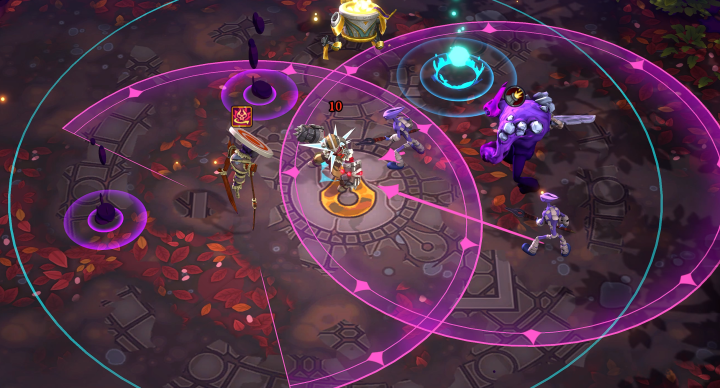
I don’t envy anyone who sets out to make a roguelike. The genre presents a wide range of challenges that can make or break a game. How long should a run take? What’s the right amount of challenge? How do you keep people coming back for one more run? The answer to one of those questions could be the wrong solution for the others. It’s the most delicate of digital balancing acts that only a handful of studios have down to a science.
Judging by Inkbound, developer Shiny Shoe might be close to joining that list. The studio already cracked the roguelike genre in 2020 with its excellent Monster Train, a deckbuilding riff on Slay the Spire with a tower defense twist. With Inkbound, which hits its 1.0 launch on April 9, takes several great ideas from that title and infuses them into something totally different. It’s a totally unique turn-based tactics game using some visual cues you’d usually see in MMORPGs.
Though Inkbound has some balance issues that may hold it back from being one of the genre’s greats, Shiny Shoe gets one important aspect right here. It has found a great way to give players a difficult mountain to climb but puts enough footholds along the way to make each failed run feel worthwhile.
The roguelike quest
Inkbound takes place in a fantasy setting where books are portals to other worlds. Players set out on a quest to hunt down some nefarious villains that are sapping those books of their ink. That narrative isn’t just a loose setup to motivate its roguelike structure. Inkbound is loaded with lore, taking notes from Hades as its story unfolds over time through chats with NPCs. It’s perhaps a little too wrapped up in its mess of proper nouns to make much sense, but it’s a respectable commitment to penning a proper universe, and the 1.0 update takes that even further.
What interests me more is Inkbound’s unique approach to combat. Rather than dealing out hack-and-slash action, each battle is a turn-based tactics encounter set in a round arena. The basic idea is that players get a certain amount of action points to spend each turn, which can be used on a bar full of abilities. The Magma Miner smashes its foes with a hammer and can leap onto enemies. My favorite class, the Weaver, attaches threads to enemies and can yank them to deal damage to everyone they’re connected to at once. Abilities sit at the bottom of the screen on a bar and operate on a cooldown.

The execution isn’t too far off from what you’d see in an MMORPG. Each attack has a specific damage radius, but my enemies’ incoming moves do too. As I navigate my turns, I need to try and get out of the position of incoming damage or at least focus on taking out enemies that will hit me if left alive when my turn ends. It’s a totally different approach for the roguelike genre, even if it comes with some frustrations. In some battles, it feels like some sources of damage are entirely unavoidable, removing some of the puzzle-like damage mitigation that makes peers like Into the Breach so rewarding.
It can be a lot to learn, too. Like Monster Train, the “character build” aspect of each run revolves around compounding buffs and bonuses. I can equip relics and apply upgrades to my attacks that give me stacks of burn damage, poison, shield, and more. There’s a massive list of terms to learn, and some are still hard to parse, even with pop-up explainers when mousing over abilities. It’s the kind of game players really need to invest in — and its long-tailed seasonal structure supports players who are in for that ride.
While I have some gripes about the learning curve, Inkbound nails down its structure. Rather than throwing players into loose run after run, it plays out much more like a traditional RPG. There’s an XP system that unlocks new upgrades and cosmetics over time, adding some great overarching progression. But more important to its success is its quest system. As I play and explore the biomes in each run, I pick up a list of story-driven quests to complete as I play. Some task me with beating bosses in specific biomes or seeking out NPCs. There’s always something to chase other than a successful run.

Those quests change the entire roguelike flow in a way that’s clicking for me. I have more specific, achievable goals whenever I set out on a run. As long as I manage to complete one by the time I die, it feels like I’ve accomplished something. It’s similar to how I engage with Hades, focusing less on escaping Hell each time and more on gathering resources or advancing the story. Inkbound takes that idea to its next level with more tangible task checklists that make runs feel like they’re part of an interconnected adventure.
Though Inkbound’s 1.0 release brings several key updates to the game, including a true end boss and controller support (it actually works quite well on Steam Deck now), it still feels like a start more than an end for Shiny Shoe. I’m still intrigued to see where it might go next with additional community feedback, something that’s already shaped it for the better. It may not connect with me as much as Monster Train in the long run, but it feels like Shiny Shoe is inching its way toward its genre-defining contribution to the roguelike canon. I can’t wait to see where it goes next, but I’ve got a lot of ink to collect until then.
Inkbound is available now on PC. It leaves early access on April 9.



